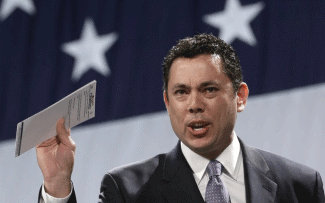by Tim Mak
4/2/15
NOTICE: THIS WORK MAY BE PROTECTED BY COPYRIGHT
YOU ARE REQUIRED TO READ THE COPYRIGHT NOTICE AT THIS LINK BEFORE YOU READ THE FOLLOWING WORK, THAT IS AVAILABLE SOLELY FOR PRIVATE STUDY, SCHOLARSHIP OR RESEARCH PURSUANT TO 17 U.S.C. SECTION 107 AND 108. IN THE EVENT THAT THE LIBRARY DETERMINES THAT UNLAWFUL COPYING OF THIS WORK HAS OCCURRED, THE LIBRARY HAS THE RIGHT TO BLOCK THE I.P. ADDRESS AT WHICH THE UNLAWFUL COPYING APPEARED TO HAVE OCCURRED. THANK YOU FOR RESPECTING THE RIGHTS OF COPYRIGHT OWNERS.

Jason Chaffetz, who as House Oversight Committee chairman is responsible for overseeing the agency, once applied for a job there and was turned down—because of his age, he says.
House Oversight Committee Chairman Jason Chaffetz, who oversees the Secret Service, never disclosed that he had applied for and was rejected from the agency in the early 2000s.
“It was because I was too old,” the Utah Republican told The Daily Beast. “I’m not sure [of the reason]…that’s more than a decade ago.”
The Secret Service now requires that applicants be between the ages of 21 and 37 at the time of appointment. Chaffetz said he was unsure whether he had applied in 2002 or 2003. He would have been 36 in 2003.
Asked whether he harbored any ill will at being rejected from the agency, he replied, “That’s pretty funny, no.” He pointed out that his grandfather had been a law enforcement agent.
Chaffetz said he “might have” applied to the FBI around the same time, as well. But he wasn’t sure, he said.
The congressman explained that he hadn’t disclosed his Secret Service application because he had spent only “10 minutes” on his application and hadn’t thought about it in years.
“I haven’t looked at that in more than a decade. It’s not something that’s entered my mind…seriously, this was like 10 minutes, 12 years ago,” he said.
In 2003, around the time Chaffetz applied, the Secret Service application form was some 50 pages long.
The congressmen said he was motivated to apply because “it was just after 9/11.” He applied for the Secret Service through a field office.
Early on in the process, he received a “BQA” letter, a rejection letter that explained he was rejected because there were better qualified applicants at the time. A BQA is a generic rejection that can take place at various points of the application process. Chaffetz said he was never given a physical test by the Secret Service.
Chaffetz, who was elected to Congress in 2008 and has chaired the Oversight Committee since January, has been on a mission to root out the causes of the Secret Service’s dysfunction.
The Secret Service, which is responsible for protecting the president and foreign dignitaries, among other functions, has suffered from a series of embarrassing scandals in the past few years.
Last year, a White House fence jumper was able to make it into the White House through an unlocked door. Later, an armed security guard was allowed in the same elevator as President Obama.
And the 2012 Secret Service prostitution scandal in Cartagena, Colombia, still hangs over the agency’s reputation.
Chaffetz’s committee announced this week that it was subpoenaing two Secret Service officials, after the agency suffered another embarrassment last month. Agents had allegedly collided with a White House barrier while an active suspicious package threat was being investigated.

